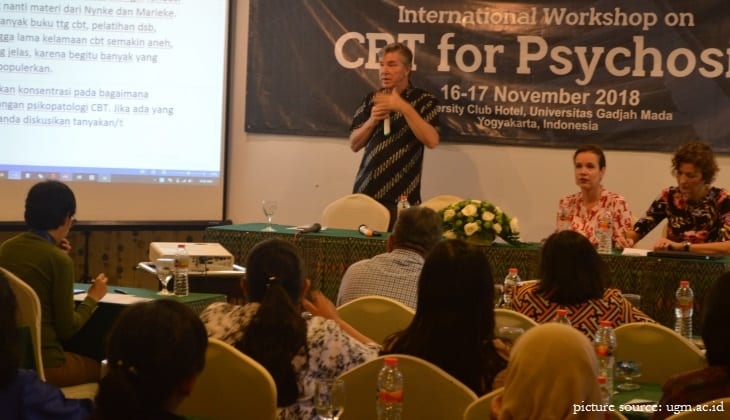
Psychosis is the general picture when thinking about someone currently facing mental illness. Someone experiencing this might find difficulty in differentiating between what is reality and what is imaginary.
Diana Setiyawati, M.HSc.Psy., Ph.D, the Director of the Center for Public Mental Health (CPMH) in UGM said that someone with psychosis may sometimes think that he/she will be killed. Or, in other conditions, someone with psychosis may imagine that someone is talking with them.
“Some people smile by themselves, because their minds are in some sort of ‘error’ mode, so they might see people smiling at them first. Some would also walk around and wander, so their families would think shackling them is a good option to keep them from getting lost”, said Diana Setiyawati, in UC UGM, on Friday (11/16) during the International Workshop on CBT for Psychosis.
According to Diana, shackling isn’t necessary and should never be an option, because by giving regular medication and psychotherapy, people with mental disorders can recover. Like someone with diabetes, drinking medication regularly and injecting themselves with insulin are ways to ‘control’ their ‘illness’.
“When a person is shackled, it’s because the family doesn’t know what to do. Maybe because they do not want them to go missing, or even because they are afraid of them,” Diana continued.
Diana said that giving medication as part of treatment is the most dependable approach. Unfortunately, there are many cases where the medication given do not work, so although they are being treated, the patients might relapse.
That’s why, she said, there should be skills acquired to prevent patients from relapsing. Patients can be helped by a relatively new approach called Cognitive Behavioral Therapy for Psikosis (CBT-P).
CBT-P is a method that focuses in straightening wrong thoughts. This method isn’t popular in Indonesia yet, but is already used overseas.
“It is said to be new, because all this time CBT has been used for people not with psychosis, but rather for people suffering from anxiety or depression. Because we already have colleagues that are experts in this, we would like to train them, our clinical practicioners,” said Diana.
Indonesia has quite a high number of people with psychosis. Data from Riskesdas in 2013 showed that 1,7 per 1000 households have a person with psychosis. The number increased in 2018 to 7 per 1000 households.
“The number increased, where now in each 1000 households there’s 7 people with severe mental illness. It’s even more than people with cancer. We hope that using this method, people with psychosis can recover and be healthy again,” she said.
UGM Psychology held the International Workshop on CBT for Psychosis as part of the events to commemorate and honor World Mental Health Day (October 10, 2018). The aim of the workshop was to make CBT-P more accessible by doctors all over the world.
Also, the workshop is an acknowledgement and support for the movement towards a shackle-free Indonesia. CBT is a therapy that is researched thoroughly and consistently, and is also updated consistently. CBT-P is one of the most recent developments.
“This event is very important for doctors, because there is a big need to develop interventions for psychosis here in Indonesia, taking in mind the significant burden it has to patients and families. It’s still part of our reality that there’s shackling of people with mental illness here. Effective intervention and empowerment will really support the actualization of the movement,” she said.
The topics were about early prevention, stigmatization, and effectiveness of CBT. Other materials were about initiating contact, treatment planning and aiming , specific CBT interventions, and CBT groups. Three experts from The Netherlands were involved in this event. They were Prof. dr. Marieke Pijnenborg (Clinical Psychology, Groningen University), Dr Nynke Boonstra (NHL Stenden University of Applied Science), and Prof. dr. Theo Bouman (Clinical Psychology, Groningen University). (UGM PR/Agung)
